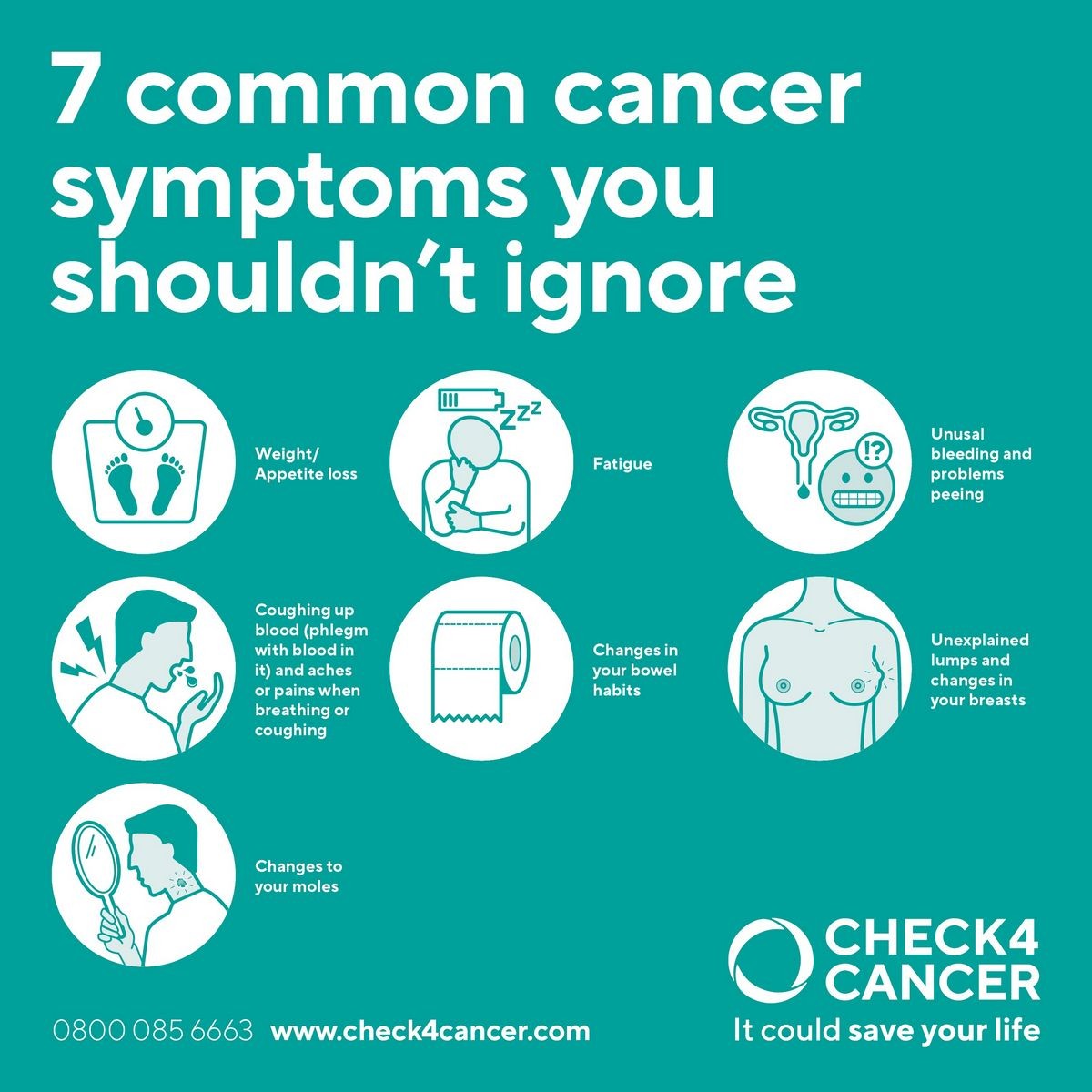
How Do You Feel if You Have Cancer?
Patients may not experience symptoms during the initial stages of cancer. Understanding the C.A.U.T.I.O.N. acronym can help spot early signs.
Cancer is an uncontrolled growth of cells that may form a mass or lump. Once cancer cells start developing, they multiply rapidly, and the newly formed cells do not function like normal cells. The patient may not experience signs and symptoms, especially during the initial stages.
Early signs can be observed by a cancer patient, which may vary depending on the type of cancer. For example, breast cancer may cause a palpable breast lump, colon cancer may cause a change in bowel habits, and lung cancer may cause a stubborn cough.
The acronym for early signs of cancer is CAUTION.
- C: Change in bowel or bladder habits
- Bowel habits: Everyone has a consistent pattern of bowel movements. If this suddenly changes or if people experience diarrhea or constipation for days on end, it is time to contact a doctor. If these bowel habits do not change with over-the-counter medications or home remedies, consult a doctor to know the root cause. This could be an indication of stomach cancer or colorectal cancer. This type of cancer is becoming more common globally because people’s lifestyles keep changing.
- Bladder habits: Regarding bladder habits, the patient may observe changes in the color of the urine, such as deep yellow or reddish, which indicates the presence of blood. These could be signs of kidney or bladder cancer, though this is extremely unusual. Deep yellow urine may suggest jaundice, and jaundice may be a sign of cancer in the liver or pancreas. In men, trouble passing pee or a frequent urge to urinate could be signs of an enlarged prostate, a risk factor for prostate cancer.
- If a wound does not heal and continues to bother, it could be a sign of cancer. Repeated trauma can exacerbate these wounds. If cancer is left untreated for months or years, it can spread into the skin, resulting in an open sore (ulcer) on the skin’s surface. If such a sore is found in the mouth, it could be an indication of oral cancer.
- If a person has a bloody discharge from their nipples, this could be an indication of breast cancer. Sudden vaginal bleeding in women who have reached menopause could be a symptom of uterine cancer. Even if the person has had a hysterectomy (surgical removal of the uterus), such bleeding could suggest vaginal cancer.
- Most women suffer irregular periods or cramps occasionally. However, prolonged pain or abnormalities in the cycle may indicate cervical, uterine, or ovarian cancer.
- Formation of lumps that may cause pain and discomfort is mostly seen with breast cancers. Women with noncancerous tumors tend to ignore and dismiss the lump. Generally, pain is the last symptom of most tumors. A painless breast lump is more harmful than a painful one. All lumps may not be cancerous, but a thorough investigation and regular follow-ups with the doctor are advised because they may turn cancerous.
- Men account for one percent of all breast cancer cases. Unfortunately, most incidences of breast cancer in men are identified late due to ignorance and stigma.
- Even if it is a lump in another area, such as the limbs, head, or underarms, and it is rapidly growing, consult a doctor.
- Difficulty swallowing is often misdiagnosed as a throat infection or something else. If symptoms such as throat pain and difficulty swallowing, along with other indigestion symptoms like heartburn, persist even after taking medication, immediate medical attention is advised. It may indicate esophageal, throat, or thyroid cancer.
- Everyone feels bloated sometimes. Bloating for more than two weeks, however, can indicate ovarian cancer or gastrointestinal cancers.
- Melanoma may be detected when moles or warts start to grow or bleed. These changes in the appearance of moles should be evaluated by a doctor.
- This should be a red flag, especially for smokers. A persistent cough could be a sign of lung or throat cancer.
All these symptoms do not always indicate cancer, but one should be on the lookout for physical changes and seek medical attention as soon as possible.
8 symptoms of cancer
The following symptoms should not be ignored, and if they persist, immediate screening should be done to determine the cause.
- Unexplained weight loss even without deliberately trying to lose weight
- Persistent fatigue or changes in energy levels even after sleeping more
- Persistent pain anywhere in the body without any cause
- Formation of painful sores or lesions in the mouth
- Headaches lasting for weeks that do not subside with over-the-counter medications
- Bruising with slight pressure or a simple hit on the skin
- Frequent infections or an increase in body temperature and night sweats, indicating weakened immunity seen with certain types of cancers
- Changes in vision and hearing
9 emotional changes seen in a cancer patient
Once cancer is confirmed, the patient’s mental health may be impacted and may fall into crisis. It is the duty of the doctor and the patient’s loved ones to understand the patient’s mental status and provide appropriate support.
These emotions may include:
- Shock: The patients are at first shocked when diagnosed with cancer or when they learn cancer has returned or progressed despite treatment. It can leave the patient confused and numb. Shock can make it difficult to process information or accomplish routine tasks. The patient may even lose track of their surroundings or feel as if time has stopped.
- Denial: Denial is the mind’s approach to dealing with uncomfortable information, such as a cancer diagnosis. A brief period of denial might be beneficial in some ways because it allows the patient to feel less overwhelmed by the news. Denial usually disappears with time, but it can be a problem if it lasts for more than a few weeks or months and prevents the patient from receiving treatment or making vital decisions. True denial, where a person refuses to accept or acknowledge the diagnosis, is unusual.
- Fear: A cancer diagnosis is terrifying. The patient may feel as if their life is out of control at times and have no idea what the future holds. This is especially true right after diagnosis, but these sentiments may come and go during and after therapy. Fear and anxiety decrease for many people when they learn more about cancer and what to expect from therapy. The patient may feel more in control once they have established a therapy program.
- Anger: Anger is a common reaction to something that appears unfair. The patient may be angry with cancer, healthcare experts, or healthy friends and relatives who do not understand what they are going through. They may be upset with God or even with themselves. People may become angry instead of expressing other feelings, such as fear or grief.
- Guilt: The patient may question if there was anything that could have been done to prevent or detect cancer sooner. They may feel remorse for how the sickness impacts their loved ones. Patients should not be blamed for cancer.
- Anxiety: Anxiety indicates that the patient is overly concerned and unable to relax. If the patient is worried about stress, they may meet a counselor or enroll in a class that teaches stress management techniques. The goal is to learn to regulate stress rather than allowing it to control them. The patient may have noticed certain signs, such as faster heartbeats, headaches, muscle pains, changes in eating habits, dizziness, shakiness, weakness, tightness in the throat or chest, stomach sickness, improper sleep, or difficulty concentrating.
- Isolation: It is natural to feel lonely or alone once treatment ends. The patient will be spending a lot more time alone, especially during time off from work. Even if surrounded by family and friends, the patient may still feel lonely. This happens if the patient believes that the people around them do not or cannot understand what they have been through.
- Depression: Many cancer patients are depressed. They mourn the loss of their health and the life they had before learning they had the disease. Even after completing treatment, they may still be sad. This is a typical reaction to any acute sickness. It may take some time to process and accept all the changes that are occurring. Eventually, the patient may experience depression, fatigue, or loss of appetite. For some, these feelings fade or diminish over time, but for others, they can become more intense, persist, and interfere with daily life.
- Hope: When patients acknowledge that they have cancer, they may develop a sense of hope. There are numerous reasons to be optimistic. Millions of cancer survivors are alive and thriving. The chances of surviving cancer are better now than ever before. People with cancer can live active lives even while undergoing treatment. Some physicians believe that hope can help the body fight cancer. Therefore, experts are investigating whether a hopeful outlook and a positive mindset may help people feel better. Here are some ideas to increase the sense of hope: plan the days the same way as always, never stop doing enjoyable things, look for reasons to be optimistic, spend time outside in nature, consider religious or spiritual beliefs, and listen to stories about cancer patients who are leading active lives.


